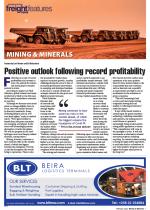Faced with an abundance of choices, Western consumers are demanding that the goods they purchase have been sourced sustainably and ethic a lly.This is putting pressure on manufacturers to be able to show the provenance of their products, from the source of the raw materials through to recycling.Mining, which is by its nature an extractive operation that’s only sustainable for as long as there is a viable deposit, is coming under increasing scrutiny.As an example, Human Rights Watch and other groups are putting pressure on automotive manufacturers to ensure that the aluminium they use is from ethical and environmentally compliant sources.Consumers are becoming more aware of how their choices affect other people and the environment.Recent studies by IBM and Accenture Strategy found that well over half of consumers in the Western world believed that buying from sustainable or environmentally responsible brands was important.In response, miners and traders are using blockchain to provide the information and assurance that their customers want.Metals and mining companies CMOC, Eurasian Resources Group (ERG) and Glencore, in collaboration with battery material supplier Umicore, are piloting ReISource to trace responsibly produced cobalt from the mine to the electric car.Announcing the initiative, Ivan Glasenberg, CEO of Glencore, said blockchain technology offered an unprecedented ability for traceability in the supply chain.“But traceability is not enough on its own; it must be part of a wider industry effort to bring improvements to the entire cobalt supply chain.“This starts with responsible sourcing compliance and supporting the artisanal and small-scale mining (ASM) sector in the Democratic Republic of the Congo (DRC) through multi-stakeholder initiatives like the Fair Cobalt A lliance (FCA).”Other mineral supply chains are under scrutiny.The founder and co-executive chairman of Ivanhoe Mines, Robert Friedland, predicts that metal prices will be affected by environmental, social and governance (ESG) standards as much as physical demand.Speaking at a 2021 Canadian exploration conference, Friedland said: “There will be no more one price for copper. There will be no more one price for gold.“Everything will be priced in relation to its ESG components and be priced in relation to how much global warming gas is created in making that commodity, because we’re going to head to a price on carbon,” Friedland concluded

